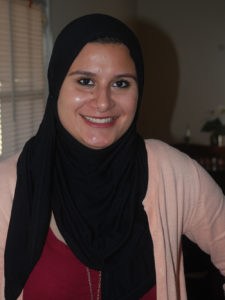Banning Muslim refugees from entry into the United States — even those vetted through a rigorous, 18-month process — is “really bad for our protection,” according to an American Muslim who works closely with Christian churches helping to resettle refugees.
Dina Shehata, a naturalized American, said that because the ban instituted by President Trump’s executive order effects only Muslim majority countries, the rest of the world will interpret that to mean “he’s excluding Muslims.”

Dina Shehata
Such action is bad for American security, said Shehata, who has a master’s degree in international relations, because Daesh (the term used by which most Arabs refer to ISIS) “believe America and the west is at war with Muslims and Islam as a whole.”
“For you to say Muslims are not welcome, that we’re suspicious and we’re not going to let them into the country, gives them [Daesh] a green light to recruit,” said Shehata, who came from Egypt at age 1. “In reality it’s not making America safer. It’s making it more dangerous for Americans worldwide.”
As an interpreter for World Relief in the Winston-Salem, N.C., area, it has been a “very emotional week, to say the least,” Shehata said. Everybody with whom she has worked is “waiting to see what happens.”
After enduring years of refugee camps and months of vetting, the families here are stoic when learning that the arrival of other vetted friends and families has been delayed indefinitely. She is aware that such potential arrivals have been asked if they prefer to stay where they are, or go to a receptive nation other than the U.S.
Shehata said she understands that refugee workers for at least one resettlement organization are not saying that resettlement to the U.S. has been paused. “They’re saying closed,” she said.
The experience of refugees being settled in the North Carolina Triad region has been “mostly good,” Shehata said. The airport meetings with greetings written in Arabic and balloons and toys for the children make refugees feel immediately welcome.
“It all changes in one action and that travel ban has shown these refugees that OK, maybe America is not tolerant,” Shehata said. “It makes them see maybe they’re not welcome in this country, that we feel there are terrorists among them, that we don’t trust you and don’t want you.”
Shehata said the executive order is a religious ban, because it affects only Muslim majority countries. If it was strictly about keeping America safe she would expect Saudia Arabia and Pakistan — centers of strong terrorist support — would have been included.
“Travel is not banned from countries he [Trump] has economic ties to,” she said. “Even though you say one thing, it’s not what the actions are showing.”
